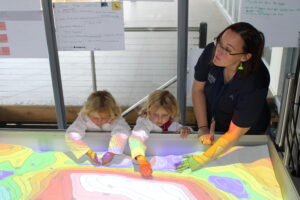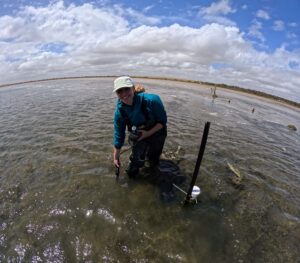

A major research program to provide high-quality, independent research to inform the future management of the Coorong has been successfully delivered by the Goyder Institute. This follows an intensive two years of field and laboratory investigations, data analysis and report writing by Research Partners of the Institute – CSIRO, Flinders University, the University of Adelaide and the University of South Australia; as well as Associate Partner the South Australian Research and Development Institute – representing a significant milestone for the Institute.
The Institute’s Mission, as outlined in its Strategic Plan, is to facilitate collaboration of governments, industries, and leading researchers to identify, develop and adopt sustainable, innovative and integrated solutions for complex water management challenges. One such challenge is how to manage the iconic Coorong to ensure that it continues to provide its critical cultural, environmental, economic and social values into the future. While there has been recovery of some elements of the Coorong ecosystem associated with increased inflows since the Millennium Drought ended in 2010, the South Lagoon remains in a degraded ecological state.
In 2018, the Goyder Institute established an Expert Panel, comprised of leading scientists to provide advice to the South Australian Government on short, medium and long-term actions to restore the South Lagoon. These recommendations, along with those identified in the Coorong Summit Summary Report, informed the $77 million Healthy Coorong, Healthy Basin (HCHB) Program, an initiative of the Australian and South Australian governments that aims to support the long-term health of the Coorong by providing evidence-based solutions to both immediate threats and future conditions under a changing climate. The Goyder Institute is the delivery partner for five research components of the HCHB Trials and Investigations Project, providing independent research to inform future management decisions for the region.
The HCHB Trials and Investigations Project was an unprecedented investment into generating critical knowledge and capability for the management of the Coorong region. It has also been unique in its delivery model, with five integrated research components delivered through the Institute partnership of collaborative research teams, comprised of 64 researchers from 13 organisations. The independent research has provided critically important knowledge, data and tools to inform management decision making. Importantly, the outputs were designed to directly inform the HCHB Program so managers of the Coorong can predict responses to different management options with much greater certainty.
Goyder Institute Director, Dr Kane Aldridge said “The completion of the Goyder Institute-led research marks a significant achievement for everyone involved. This multidisciplinary program has provided high-quality research to underpin the management of the Coorong region and has built on the collaborative model of the Institute by building partnerships with new organisations and communities. We are extremely proud and appreciative of the commitment of the researchers from our Partners to meet this important milestone, particularly when operating during a global pandemic. We would like to thank all involved, including our research partners, collaborators and the South Australian Department for Environment and Water and the HCHB Program for their commitment for the delivery of this major research program”.
Although the research was focussed on informing existing challenges for the Coorong, the research will have a long-lasting legacy. Dr Alec Rolston, Goyder Institute Research Program Manager, said “The completion of this research marks a significant point in the ongoing commitment to improve the environmental health of the Coorong. As well as the collaborative success of the project, the inclusion of 18 early career researchers in the delivery of the work provides a really strong foundation for the future of environmental research and management, providing important training and development for future water leaders for the Coorong region and beyond.”
While the HCHB Trials and Investigations research has now come to an end, communicating the results of the work and facilitating uptake into decision-making will be an ongoing activity delivered in partnership with the South Australian Department for Environment and Water.
“A total of 23 peer-reviewed technical reports will be produced through this Goyder Institute research, providing a robust knowledge base to make decisions upon. These reports will be published on the Goyder Institute website following the completion of our approvals process, with a number already available” said Dr Rolston. “In addition, our researchers will be developing scientific papers for publication in international peer-reviewed journals. Some key results have already been communicated through previous eNews articles and we will produce further communications to highlight and synthesise the important findings and implications of this research. So, stay tuned for further eNews articles on this work as well as other media communications” he said.
More details on the Goyder Institute-led Components of the HCHB Program can be found here. For any further information, please contact Dr Alec Rolston.



